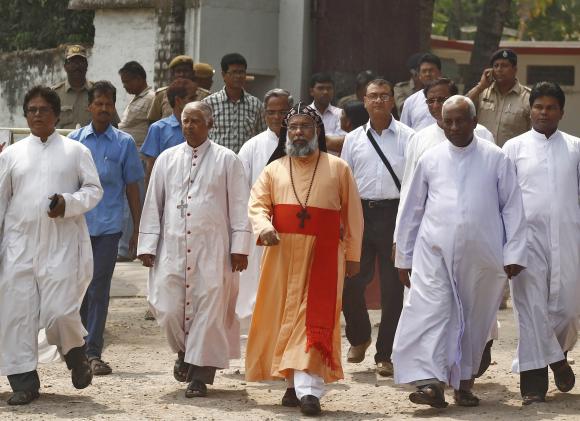
The head of India’s Catholic bishops, speaking out after a nun was raped in the east of the country last week, has said the country should be as concerned about the welfare of its people as it is about its cows.
The comments appeared directed against hardline Hindu nationalists who have stirred up animosity against India’s Christian and Muslim minorities, while successfully lobbying for tougher laws against killing cows.
Cows are considered sacred by many Indians, but beef is eaten by some poor and lower-caste Hindus as well as by Christians and Muslims. Campaigns to protect cattle are often used to vilify religious minorities.
“The country has a responsibility towards all of us — every human being — and not just cows,” Cardinal Baselios Cleemis told journalists. The comments, reported in newspapers on Wednesday, were confirmed by his office.
The western state of Maharashtra banned the selling of beef in February and the northern state of Haryana has since imposed stringent penalties for cow slaughter.
Cleemis spoke before visiting the hospitalized nun who was raped at a convent school in West Bengal, an attack which has triggered protests on city streets and in parliament.
Police have not established whether the assault motive was religion or money. Prime Minister Narendra Modi of the Hindu nationalist Bharatiya Janata Party (BJP) said he was “deeply concerned” and demanded a detailed report into what happened.
The attack was the most serious in a series of incidents that have spread fear among Christians since activists, emboldened by Modi’s election victory last year, began their “ghar wapsi” (homecoming) campaign to convert followers of “foreign religions” to Hinduism.
Indian Christians emphasize their religion’s long history in India and say it is an integral part of the country. Some Hindu hardliners, however, are seeking to define the country as primarily an Hindu nation, in which other religions are guests.
Cleemis is head of the Syro-Malankara Catholic Church, an Indian branch of the faith that is in communion with Roman Catholicism and that traces its roots back to the Thomas the Apostle, who tradition says arrived here in the first century.
The same weekend as the convent school was attacked, activists partly demolished a church being built in the state of Haryana, near Delhi, replacing its cross with a Hindu image.
A few days before the demolition, a member of parliament for Modi’s Hindu nationalist ruling party, Subramanian Swamy, was criticized for saying that churches and mosques were not sacred buildings.
REUTERS

Leave a Reply
You must be logged in to post a comment.